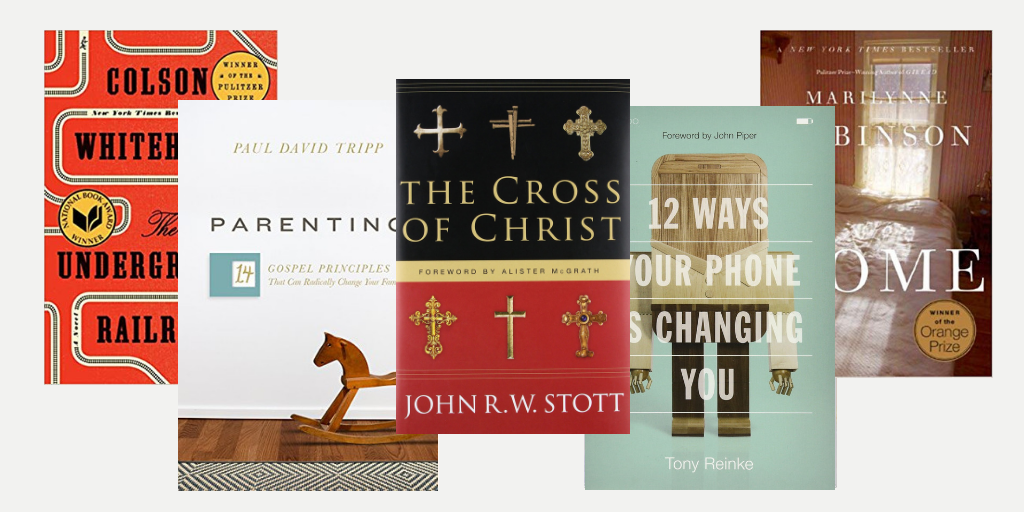
Friends, behold, my favorite books from 2018! The art of reading felt different this year––slower––as we welcomed our daughter and enjoyed our first year with her (a blessing!). But I preferred the slowness, I think, as it helped me appreciate the quiet moments more and process what I was reading with greater clarity.
The titles I’m sharing with you below follow the criteria I first used in 2015’s Reading Favorites article:
If one of the main purposes of books is to make the reader think, then these are the ones I’d say made me think most deeply, curiously, and enthusiastically this year. (I’ve chosen a first prize and a runner-up for each genre.) I hope these thoughts might sway you to read a few of these titles, yourself!
Theology
First Prize: The Cross of Christ (John Stott)
I’m only halfway through Stott’s excellent book, but can already give it my highest commendation. He’s a master of accessible theology, drawing out the atonement with confident clarity, biblical richness, and a humble sensitivity to its mysteries. Many people put this book on their must-read-in-this-lifetime list, and I fully agree. Read it as soon as you can!
Runner-Up: The Whole Christ: Legalism, Antinomianism, and Gospel Assurance―Why the Marrow Controversy Still Matters (Sinclair B. Ferguson)
Ferguson, in his wonderful treatment on the law and the gospel, helped me see that legalism goes beyond our common definition: It’s not simply trying to work our way to God, it’s divorcing God’s good character from his law, and viewing it apart from his heart to save sinners. Ferguson exhorted me to hold fast to “the marrow” of the gospel, the cure for both legalism and antinomianism, in writing and teaching in any context. If you’ve ever been confused about the place of the law in the gospel, read this book.
Biography, Memoir, & Historical Fiction
First Prize: The Underground Railroad (Colson Whitehead)
The storyline of Whitehead’s novel depressed me, making me wonder if I could genuinely call the book a favorite––but I think that’s his point. He brings to light the horrors of slavery in America, and how quickly hoped-for dreams of freedom could be dashed for those who took the risk and ran. Read this for the rawness of his writing and for perspective.
Runner-Up: Gay Girl, Good God: The Story of Who I Was, and Who God Has Always Been (Jackie Hill Perry
I had the honor of reviewing Perry’s memoir for The Gospel Coalition, so I’ll point you to it here!
Christian Living
First Prize: Parenting: 14 Gospel Principles That Can Radically Change Your Family (Paul David Tripp)
If I had to choose one book that stood out among the rest, a favorite of favorites, Parenting is it. No other book caused me to think as much as this one (probably because we’re new parents). Tripp builds a theological foundation for why we parent; the most striking part for me was the truth that God is parenting me as I parent my daughter. Many other moms have told me this is their favorite parenting book, and for good reasons!
Runner-Up: The Imperfect Disciple: Grace for People Who Can’t Get Their Act Together (Jared C. Wilson)
Wilson is a skilled (and prolific) writer of many practical theology books, and this one is no exception. As a perfectionist who struggles with sin and failure, I was helped to read Wilson’s words: “Jesus is for losers.” I always appreciate his push-back on false gospels; in this book, he confronts the church’s typical definition of discipleship (doing good things) with what it really is (coming to Jesus over and over and over again). I often recommend this one to people who find grace hard to believe.
Vocation & Learning
First Prize: 12 Ways Your Phone Is Changing You (Tony Reinke)
Confession: I listened to Reinke’s book on audio while sleep-deprived and in the fog of early motherhood. But that season was actually the perfect time to listen: I knew I didn’t want to waste away my nursing sessions on my phone. Reinke’s hard work and research is astounding and has clearly blessed many readers, based upon the feedback I’ve read and heard in the last year. Our phones are incredible tools, but they often rule over us; Reinke helped me think about my motives and habits, and especially what these communicate to the people in the room with me.
Runner-Up: Dig Deeper: Tools for Understanding God’s Word (Nigel Beynon & Andrew Sach)
I’m not finished with this yet, but it’s wonderful! Short chapters teach the reader how to study their Bible using memorable tools like structure, context, and linking words. If you want an accessible book on Bible study, this is it.
Fiction
First Prize: Home (Marilynne Robinson)
After Gilead was recommended to me by everyone and their brother, I finally picked it up. I didn’t enjoy Gilead as much as I did Robinson’s second novel, Home, a harrowing tale of family dynamics, personal sin, and hope deferred. Robinson is a gifted writer, one whose novels I hope to read to completion.
Runner-Up: Jayber Crow (Wendell Berry
The story of small-town barber, Jayber Crow showcases the beauty of the ordinary. Berry writes like a song, so while the novel’s plot line feels slow, it’s a welcome slowness full of enjoyable rhythms, eclectic personalities, and depth. Like Robinson’s three Gilead books, Berry’s other books stand alone but are based in the same place. Read them if you want to slow down.
I hope these suggestions prompt you to read great books in 2019. Any suggestions for the books you enjoyed this year? Leave titles in the comments––I’m always looking for great ones.